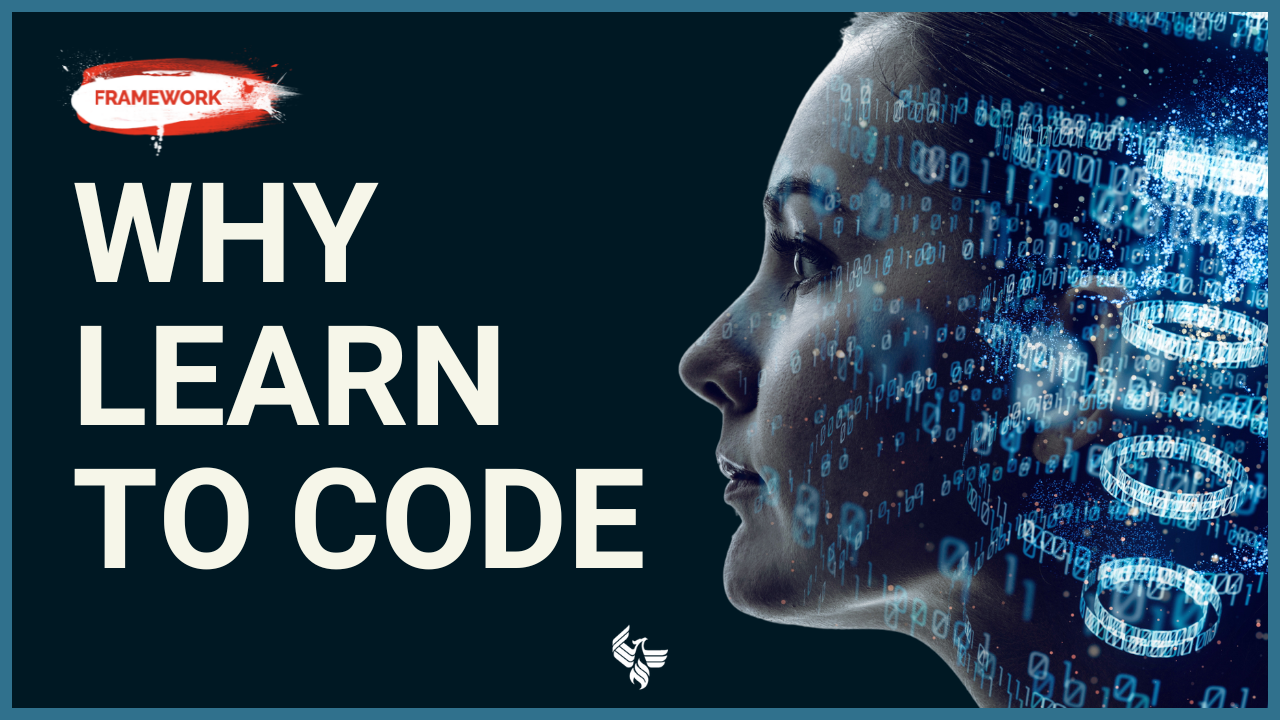Articles > Information Technology > The benefits of learning to code
The benefits of learning to code

Written by Michael Feder

Reviewed by Kathryn Uhles, MIS, MSP, Dean, College of Business and IT

What are the benefits of learning to code?
Learning to code is becoming more valuable in today’s digital workplaces. A 2020 survey by McKinsey & Company found that 87% of employers were already experiencing a skills gap or expected to deal with one within the next five years. Nearly 70% of companies predicted their deficiencies would be in data analytics, web and mobile management, and design. These areas require knowledge of computer code and programming languages.
A degree in computer science includes a knowledge base in analytics, computer systems and multiple programming languages. Such talent has been in high demand for the past few years. A 2020 study by IT consulting firm SHL found that HR departments could only fill 60% of IT jobs with qualified candidates.
Candidates in many fields with the ability to use popular coding languages could be more attractive to employers. This increasing demand for skilled and even beginner programmers extend around the world. A survey by NTUC LearningHub found that 84% of companies needed people who code in various positions, and 28% said most jobs in their company required some coding knowledge, according to IT Brief Australia.
Take the programming language Python, for example. Python is a computer programming language often used to build websites and software, automate tasks and conduct data analysis. Python is a general-purpose language that is useful for creating a variety of different programs. Since Python is not considered hard to learn, relatively speaking, beginner programmers can get started developing their knowledge and learning the language early in their studies.
Here is a closer look at why learning to code can bring many opportunities in the workplace.
Coding vs. programming
The terms coding and programming are sometimes used interchangeably, but the two specialties have vital distinctions.
Coding is the translation of ordinary language into a computer script that gives software instructions about how to complete specific processes. A coder writes these directions using a system of commands (syntax), otherwise known as a computer language.
Coders create directions for the computer to follow to complete each specific process. However, computer programming involves putting these different functions together to create a program. Programmers use specific processes to compile code, test it and produce a functioning program. They also manage the software throughout its life cycle, providing language updates and bug fixes when necessary.
While coding knowledge allows you to work on computer programs using specific languages, programming is necessary for producing and managing complete applications and software packages.
6 benefits of learning to code
The insights from McKinsey and others show that learning to code provides a very marketable job skill. While most students focus on technical abilities and the job opportunities they may open up, there are broader benefits to learning coding languages and their syntax, including developing soft skills that can help in any role within a company.
Here are six potential benefits of being able to code and developing advanced computer programming knowledge.
1. Improve your analytical abilities
Through the practice of coding, computer programmers develop strong analytical abilities. Coding requires defining a goal and writing a computer script that performs the processes necessary to reach it. You may also have to analyze existing code and find ways to improve it, eliminate unnecessary scripts or create more efficient processes.
An analytical approach to problem-solving is also important as a coder. You need to be able to assess the problem, find a solution, apply it and test the results. These abilities are valuable in almost every professional setting, helping you use logic and well-defined steps to solve problems and improve performance.
2. Enhance your creativity
Creativity is essential to any language skill and coding is no exception. When working with existing computer languages, you need to use them to create a unique system designed to accomplish a specific process. This process often involves coming up with a one-of-a-kind solution, testing it, and making changes and improvements until it becomes fully functional.
This creativity has applications beyond coding. Whether you work in manufacturing, HR, accounting or another department, the process of brainstorming, testing outside-the-box solutions and perfecting them can drive advances and innovations in your workplace -- another reason why learning to code has become such an important skill. This creativity can also lead to new learning opportunities and growth.
3. Communicate internationally
Programming languages like Python, C++, JavaScript and HTML are the same worldwide. People who speak different languages can understand each other’s code without translation.
Knowledge of this coding language gives you the ability to collaborate with people around the world and understand the processes used in different industries through the way they employ computer code.
4. Be part of a community
Coders and programmers have access to communities, groups and professional organizations built around their chosen languages. For example, Python, a common programming language with innumerable applications, has an active community with forums, in-person and virtual events, and resource sharing.
JavaScript, another widely used back-end language, has a similar community offering resources, events and support for coders. Regardless of your chosen coding language, you will likely find organized groups offering professional resources, support and opportunities to socialize, making your journey in learning to code a very engaging one.
5. Open up career opportunities
Professionals with coding experience can apply for tech jobs and potentially stand out from applicants in other positions thanks to their coding knowledge. There are many opportunities in tech specialties. Here are some requiring programming skills.
- Data analysts are in high demand, with McKinsey saying that this specialty has the biggest skill gap of all. The U.S. Bureau of Labor Statistics (BLS) projects a 36% increase in employment for data science specialists between 2023 and 2033.
- Overall employment of software developers, quality assurance analysts and testers is projected to grow by 17% from 2023 to 2033, according to BLS. This is projected to open 140,100 openings per year.
- Employment of computer systems analysts is projected to grow by 11% from 2023 to 2033, according to BLS. This translates to 37,300 openings per year.
- Database administrators and architects are also in demand, with e-commerce, data science and analytics playing an increasingly important role in business operations. BLS forecasts an 9% increase in these fields between 2023 and 2033.
These career paths provide examples of the potential opportunities available to people who are learning to code.
BLS Occupational Employment Projections, 2023-2033 is published by the U.S. Bureau of Labor Statistics. This data reflects BLS’ projections of national (not local) conditions. These data points are not specific to University of Phoenix students or graduates.
6. Develop transferable skills
Technical skills, such as machine learning, can potentially help you land jobs outside of IT. Smaller companies or organizations may hire you to handle IT duties in addition to nontechnical jobs. However, many of the soft skills you develop by learning to code can serve you well in any professional setting.
- The logic-based approach to problem-solving you learn through coding can help you find solutions to issues everywhere from offices and manufacturing floors to hospitality businesses and retail stores.
- The attention to detail you need to succeed as a coder can give you the level of concentration necessary to complete nuanced tasks in any setting.
- The perseverance needed to handle the sometimes lengthy and frustrating testing and debugging processes can help you handle the challenges and setbacks that come with every job.
- Record-keeping is important in coding jobs, with each member of a programming and coding team needing to document their work and record changes and bug fixes. This ability translates well to positions requiring documentation or the presentation of organized information.
- Many sectors, such as marketing, sales, inventory management and accounting, may have opportunities for workers with coding abilities. In these settings, you can use your knowledge to customize, configure or manage software needed for your department’s processes.
There are various other courses and certificates to help upskill your knowledge in particular areas you feel you still may need help improving or want to learn.
How to learn and improve coding and programming skills
You can take several approaches to developing your coding and learning programming methods if you’re a beginner.
- A computer science degree provides a more complete knowledge base. During an undergraduate program, you will typically learn several programming languages and become familiar with processes for developing software.
- An IT certificate is an option if you know the coding system or specialty you want to learn. These programs allow you to focus on your chosen area without spending time on other subjects.
- Coding boot camps or individual online IT courses can provide an intensive introduction to a coding language or system. These experiences require a short-term commitment, but some boot camps can be intense, requiring eight or more hours per day of study.
Learning to code in a computer science program
If learning to code and gaining more knowledge about programming languages interests you, consider pursuing a degree in computer science at University of Phoenix (UOPX). Whether you’re a beginner or an existing IT employee looking to build your skill set, UOPX offers online courses for those who have a busy schedule and need to set their own pace with a flexible educational path.
The UOPX Online Computer Science Degree offers courses in data programming languages, JavaScript programming, software architecture, data structures for complex problem-solving and more. You’ll learn skills such as complex problem-solving skills, integration, software engineering and leadership.
If software development interests you, consider our Advanced Software Developer Certificate. This program teaches aspiring software developers how to develop programming, software engineering and IT architecture skills. You will have the opportunity to study multiple programming languages and software architecture principles.
UOPX also offers an Undergraduate Certificate in Scripted and Compiled Programming Languages. This certificate covers the foundations of Python and JavaScript to help graduates create programs used in cybersecurity, data analysis and application development.
Need help figuring out what direction to go in? Then request more info on this and other UOPX programs.

ABOUT THE AUTHOR
A graduate of Johns Hopkins University and its Writing Seminars program and winner of the Stephen A. Dixon Literary Prize, Michael Feder brings an eye for detail and a passion for research to every article he writes. His academic and professional background includes experience in marketing, content development, script writing and SEO. Today, he works as a multimedia specialist at University of Phoenix where he covers a variety of topics ranging from healthcare to IT.

ABOUT THE REVIEWER
Currently Dean of the College of Business and Information Technology, Kathryn Uhles has served University of Phoenix in a variety of roles since 2006. Prior to joining University of Phoenix, Kathryn taught fifth grade to underprivileged youth in Phoenix.
This article has been vetted by University of Phoenix's editorial advisory committee.
Read more about our editorial process.


Get your free IT Program Guide
Learn how 100% of our IT degree and certificate programs align with career-relevant skills.
Thank you
Download your pdf guide now. Or access the link in our email.



